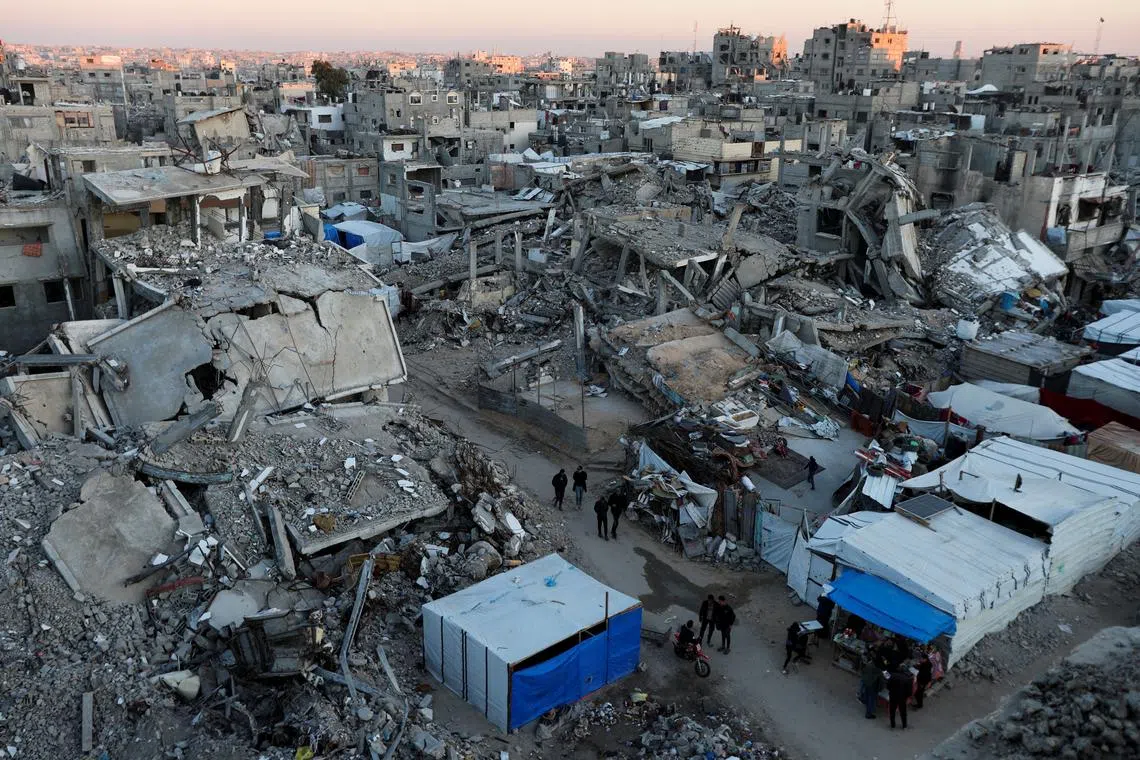Israel and Hamas diverge over ceasefire with first phase set to expire
Sign up now: Get ST's newsletters delivered to your inbox

Palestinians walking past the rubble of buildings, amid a ceasefire between Israel and Hamas, in Khan Younis, in the southern Gaza Strip, on Feb 27.
PHOTO: REUTERS
CAIRO/JERUSALEM - An Israeli delegation in Cairo is negotiating to extend the first phase of the Gaza ceasefire when it expires on March 1 rather than move to the second phase as originally planned and as Hamas wants, two Egyptian security sources said on Feb 28.
The ceasefire agreement in January halted 15 months of fighting and paved the way for talks on ending the war, while also leading to the release of 44 Israeli hostages held in Gaza and around 2,000 Palestinian prisoners and detainees held by Israel.
However, Israel and Hamas have accused each other of violating the ceasefire, casting doubt over the second phase of the deal meant to include releases of additional hostages and prisoners as well as steps towards a permanent end of the war.
There is no sign of agreement, either among or between Israelis and Palestinians, or between Western and Arab governments, over Gaza's future. That uncertainty is complicating efforts to negotiate a lasting resolution.
Hamas called on Feb 28 for the international community to press Israel to immediately enter the second phase without delay. It is unclear what will happen if the first phase ends on March 1 without a deal.
A senior official of the Palestinian Authority, State Minister of Foreign Affairs Varsen Aghabekian, also said on Feb 28 that she would like the ceasefire phases to move ahead as originally planned.
"I doubt anyone in Gaza will want to go back to war," she said in Geneva.
The Cairo talks are being mediated by Egypt and Qatar with US support. US President Donald Trump said on Feb 27 there were "pretty good talks going on".
Asked whether the ceasefire deal would move into the second phase, Mr Trump said: "Nobody really knows, but we'll see what happens".
The Gaza war is the latest in decades of conflict between Israel and Palestinians.
It began on Oct 7, 2023,
The Israeli military campaign in retaliation has killed more than 48,000 people, according to Palestinian authorities, while destroying large swathes of the tiny, crowded territory and leaving most of its two million inhabitants homeless.
Ceasefire
The ceasefire has mostly held during its first six weeks, although both sides have accused each other of breaches, particularly in the treatment of Israeli hostages and Palestinian detainees, and in the handling of releases.
The United Nations has described images of both emaciated Israeli hostages and released Palestinian detainees as distressing, saying they reflected the dire conditions in which they were held.
Hamas has staged shows of strength during hostage releases, parading them in front of cameras. Israeli authorities have made released detainees wear clothes bearing pro-Israeli slogans.
Israel is now negotiating to extend the first phase of the ceasefire deal by 42 days, according to the Egyptian security sources.
Israeli government officials said earlier this week that Israel would attempt to extend the initial phase with Hamas freeing three hostages a week in return for the release of Palestinian detainees.
Discussions on an end to the war are complicated by the lack of any agreement over basic questions such as how Gaza would be governed, how its security would be managed, how it could be rebuilt, and who would pay for that.
Mr Trump proposed this month that the US should take over Gaza and redevelop it as a "Riviera of the Middle East" with its population displaced into Egypt and Jordan.
Arab countries have rejected that idea but have yet to announce their own plan.
European countries have also rejected the displacement of Palestinians and say they still support a two-state solution to the conflict. REUTERS


